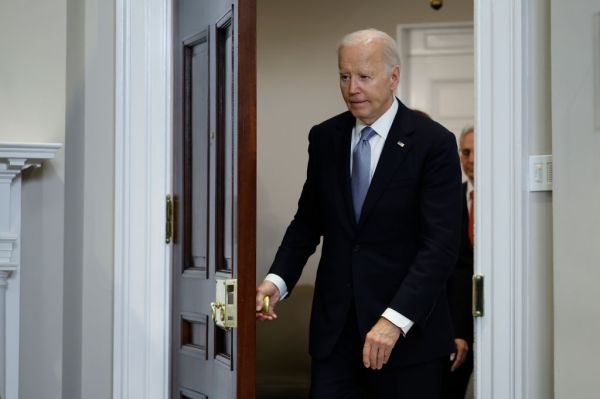On Monday night, Republicans didn’t know for sure if they would win a majority in the House of Representatives. But that didn’t stop them from pressing ahead with their leadership elections this afternoon, a week after their underwhelming midterms performance.
GOP Leader Kevin McCarthy shouldn’t have too much trouble clearing the internal conference vote today, where he needs only a simple majority of Republicans to become the speaker-elect.
But the real test will come in January, when he’ll have to win 218 votes on the House floor to take the speaker’s gavel. Republicans may have the majority by only a few seats, leaving virtually no margin for disagreement within the party. Members of the House Freedom Caucus are mounting a challenge by Rep. Andy Biggs in today’s internal conference vote, part of their efforts to get McCarthy to agree to rules changes to open up the legislative process and to give conservatives more power.
How much support Biggs draws away from McCarthy will determine how much work the GOP leader will have to do to make his speakership dreams a reality.
But McCarthy is getting help from some unexpected places: Even as some far-right members were planning to present a challenger on Monday, others were calling for unity behind McCarthy.
Rep. Dave Schweikert, an Arizona Republican and member of the Freedom Caucus, told The Dispatch he won’t be supporting Biggs. “Andy’s been a friend of mine most of my life,” he said. “We’ve known each other since we were in our 20s. But this isn’t the place or the time.”
McCarthy, he added, “is a savant at human nature. And if you’re going to have a very close conference, you need people who are really good at people.”
And Rep. Marjorie Taylor Greene of Georgia cautioned against challenging McCarthy, arguing it could open the door to moderate Republicans working with Democrats to create a Liz Cheney speakership. Cheney is set to leave Congress this year after losing her primary race, but the Constitution does not require the speaker to be a member of the House.
Revenge of the Moderates?
Greene’s fear isn’t unfounded: Loose-cannon MAGA types won’t be the only people with the ability to throw a wrench in GOP leadership’s plans. With a margin of error this small, moderates will have the ability to make their presence felt too.
But their style isn’t anything like the Freedom Caucus’.
Their potential impact became evident Monday night, when Rep. Don Bacon of Nebraska made a remarkable statement to NBC News: If Republicans can’t come together to agree on a choice for speaker, he’d be willing to strike a deal with Democrats to give the gavel to a moderate Republican.
“I will support Kevin McCarthy, but if we do get to that point, I do want the country to work and we need to govern,” Bacon said. “We can’t sit in neutral; we can’t have total gridlock for two years.”
He backtracked with Politico later, saying that it’s “not even a realistic scenario in my view,” and that’s how he thought he framed it in his comments to NBC.
Pennsylvania Rep. Brian Fitzpatrick is another moderate Republican whom Democratic aides have eyed for what some of them describe as the unlikely “Sorkin scenario,” named after the earnest writer of The West Wing.
Such a move wouldn’t be unprecedented. In 2009, Tennessee GOP state Rep. Kent Williams upended his party’s leadership plans in a 50-49 House by striking a secret deal with Democrats: They would unanimously support him for speaker in exchange for his agreeing to a bipartisan power-sharing plan. The plan worked: Williams served two years as speaker. Although enraged Republicans immediately kicked him out of the party, he won two more terms as an independent before stepping down.
But on Monday night, Fitzpatrick said he wasn’t interested in any outside-the-box wheeling and dealing like that: “Kevin is going to get elected speaker.”
He also insisted he’s not willing to cause chaos like the Freedom Caucus to push his own policy goals. “We need to be building bridges, not driving wedges,” Fitzpatrick, who is co-chair of the bipartisan Problem Solvers Caucus, told The Dispatch.
“Everyone can always say that they have leverage. Every person can say that,” he added. He’s more interested in working for two-party solutions, like the semiconductor chips funding package and the gun safety legislation passed in the current Congress.
“I hope we can have an opportunity to do that, where you have a bipartisan bloc that overcomes the extremes,” he added.
Others, such as Florida Rep. Maria Elvira Salazar, made it clear they’re fully behind McCarthy. She told The Dispatch she’d be willing to use the leverage of close margins to move the ball forward on immigration legislation, “a topic that we need to tackle, both parties coming forward. Because that way we can include those people, some of whom I represent, that are in the shadows.”
The interviews underscore what’s likely to be a permanent feature of the next Congress: any small group’s ability to scuttle any partisan plan for any reason. And even with most energy understandably focused on leadership elections this week, lots of members are already gearing up to use that power. “In a tight majority, every vote and every voice matters. And I intend to leverage that,” Rep.-elect Mark Molinaro, Republican of New York, said to Bloomberg Government.
But moderate Republicans and members from swing states naturally have more incentive to keep the government running. It’s not clear if any of them will be willing to play hardball in the same way Freedom Caucus members are. The biggest showdowns will come in government funding debates and in the annual defense authorization package next year, when the House will have true opportunities to make policy in a divided government.
The House’s state of affairs is unlikely to create the sort of scenario we’ve seen in the Senate in the last two years, where Democratic Sens. Kyrsten Sinema and Joe Manchin’s political power skyrocketed thanks to their decisive role as moderate swing votes. That was a function of a tight but stable relationship between the parties: Democrats could pass bills under reconciliation if their two moderates signed on, and they couldn’t if they didn’t. In the upcoming House, by contrast, any given bill could end up shedding members three dozen different ways.
“Everyone has some leverage, which means no one really has any,” outgoing GOP Rep. Peter Meijer told The Dispatch. “Anyone who knows how this plays out is kidding themselves.”
Could the House Flip After the 118th Congress Begins?
There’s typically a decent amount of turnover in the House during a session of Congress. Whether it’s members resigning, leaving for different jobs, or dying, the natural ebbs and flows of House membership could have an outsize effect this Congress if the House majority ends up being just a few seats strong. And special elections to replace those members could narrow or flip control until the 2024 elections.
In the current Congress, five members died while in office and another died before being sworn in, according to the House Press Gallery’s casualty list. One was indicted and resigned afterward. Five other members resigned to take different jobs. Three Democrats left to work in the Biden administration. Another was appointed lieutenant governor of New York.
And power-flips have happened before: The 72nd Congress would have started with 218 Republicans, 216 Democrats, and one member of the Farmer-Labor party, but 14 elected members died before the Congress began. Democrats took control by winning special elections and stayed in the majority through the end of the session.
Republicans Say They’re Sure About Ending Proxy Voting
While the speakership situation remains fluid, McCarthy emerged from a GOP meeting Monday evening sure of a few institutional changes: “Proxy voting goes away, magnetometers go away, bills work through committees.”
But with a thin majority, McCarthy will be spending a lot of time herding cats if he does get rid of proxy voting entirely. Every illness, family emergency, and flight delay will dictate his ability to pass bills from one day to the next. Not to mention the absenteeism of campaign season ahead of the 2024 election.
Republicans have long argued against the pandemic-era proxy voting system Democrats put in place, which has had its fair share of abuse. They say it cuts down on face-to-face debate and legislating, driving parties away from collaboration. Democrats point out it has allowed members sick with coronavirus or out of commission from surgeries to have a voice in legislation.
Rep. Mike Gallagher, a Wisconsin Republican and a fierce critic of remote voting, told The Dispatch in a statement that his position is also unchanged despite the midterm election results. When McCarthy wins the gavel in January, Gallagher said, he will deliver on Republicans’ promise to “end the unconstitutional abomination that is proxy voting once and for all.”
Dealing With the Debt Ceiling
If House Republicans capture the House as projected, they want a showdown with Democrats over spending, with the debt ceiling as leverage. Democrats want to stop that fight before it even begins, but it’s unclear if they can.
McCarthy and senior Republican lawmakers have signaled in recent months that they plan to use a debt ceiling deadline next year as leverage for government spending cuts and or reforms to social safety net programs. Democrats want to raise the debt ceiling during the lame-duck session to avoid that exact outcome.
“Our best shot, I think, is to do it now,” House Speaker Nancy Pelosi said on ABC News over the weekend. Senate Majority Leader Chuck Schumer told Bloomberg News on Monday that Democrats would like to get the debt ceiling resolved “in this lame-duck session and it should be done in a bipartisan way.”
It may feel like deja vu for President Joe Biden. The two parties went tit-for-tat over raising the nation’s borrowing limit more than a decade ago, when Biden was serving as vice president. Biden helped negotiate the deal with Senate Republican leader Mitch McConnell, agreeing to spending cuts just before America hit its borrowing limit. Coming that close to default troubled global markets while leading to a downgrade in America’s credit rating.
“It needs to be resolved,” Sen. Gary Peters, a Michigan Democrat, told The Dispatch Monday. “The United States government has to pay their bills. We can’t risk a default and the creditworthiness of the country.”
Other rank-and-file Democrats agreed raising the debt ceiling should be a priority before the new Congress gavels in. But none could predict how, exactly, the party will pull it off. “Still working on that,” Peters said.
“We should get it done this year. I don’t yet know what the vehicle is,” Sen. Chris Murphy, a Democrat from Connecticut, added. He said negotiations to fund the government through the fiscal year are an obvious option. But that would require getting at least 10 Republicans on board—assuming every lawmaker who caucuses with Democrats votes in favor of it—to overcome the Senate’s 60-vote threshold to pass most bills.
“I would hope that Senator McConnell doesn’t want to leave this until next year,” Murphy added.
If Republicans don’t want to support a debt ceiling increase or suspension, though, Democrats technically have the power to advance another budget reconciliation measure, which would allow them to circumvent the 60-vote threshold and pass it with a simple majority, without the need for any Republican votes. That would take time: two lengthy amendment vote-a-ramas are a part of that process, and the chamber’s to-do list before the end of the year is already getting crowded. Senators have to pass the annual defense authorization bill and government funding, among other priorities.
Still, Sen. Brian Schatz, a Democrat from Hawaii, said it is a matter of political will rather than timing.
“If we want to do it, we can do it,” he said. But, he added, “I haven’t done any counting yet.”
Sen. Mitt Romney, a Utah Republican, suggested he may be open to negotiation to raise the debt ceiling this year. He told reporters Schumer “would be wise to get it done while he has a Democratic House, and I hope that we’re able to get some limits on spending that would accompany that vote.”
But he demurred when The Dispatch asked if the increase should be done in a bipartisan manner or if Democrats would have to fly solo: “It needs to get done—however we get it done.”
On the Floor
The House will consider a bill to limit nondisclosure agreements when workers allege sexual assault and harassment crimes committed in the workplace. The legislation, which passed with no opposition in the Senate earlier this year, applies to pre-dispute contracts and is intended to empower abuse survivors to speak about their experiences publicly.
Members are also expected to vote on several bills related to the Department of Veterans Affairs, including one strengthening cybersecurity. A full list of measures the House may consider this week is available here.
Senators are expected to vote on a bill protecting same-sex marriages this week. Read the bipartisan agreement to try to advance the bill here. The chamber will also consider judicial nominees.
Key Hearings
- The House Homeland Security Committee is meeting this morning to hear from senior administration officials on worldwide threats to the United States. Witnesses include Homeland Security Secretary Alejandro Mayorkas, FBI Director Christopher Wray, and National Counterterrorism Center Director Christine Abizaid. The same officials will testify again before the Senate panel on Thursday morning. Information and video here and here.
- Senators on a Homeland Security subcommittee will share details from their investigation into medical mistreatment of women in Immigration and Customs Enforcement custody this afternoon. Information and livestream here.
- State Department officials will appear before the Senate Foreign Relations Committee Wednesday morning for a hearing to assess American policy in the Caucasus. Information and livestream here.
- The Senate Judiciary Committee will hold an oversight hearing for the Department of Homeland Security Wednesday morning. Information and livestream here.











Please note that we at The Dispatch hold ourselves, our work, and our commenters to a higher standard than other places on the internet. We welcome comments that foster genuine debate or discussion—including comments critical of us or our work—but responses that include ad hominem attacks on fellow Dispatch members or are intended to stoke fear and anger may be moderated.